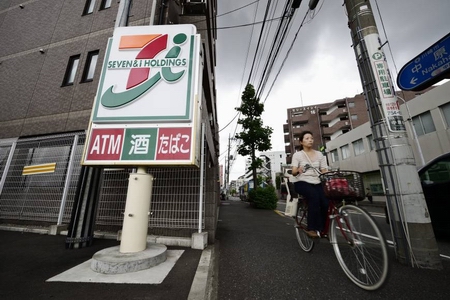
Over the past 39 years, Toshifumi Suzuki has expanded 7-Eleven to 50,000 outlets, more than any other retail chain. Now, at the age of 80, he says he has no interest in retiring. He’s got too much work to do.
“I’m not thinking about it at all yet,” said Suzuki, chief executive of Japan’s Seven & I Holdings Co., global owner of the home of the Slurpee.
High on Suzuki’s to-do list is a renewed focus on the U.S., where the chain was founded 86 years ago when a Dallas ice maker began selling eggs, bread and milk. Suzuki opened Japan’s first 7-Eleven in Tokyo’s bayside Toyosu district in 1974 and built the brand into Japan’s biggest convenience store chain. Then in 1991, after 7-Eleven brand owner Southland Corp. filed for bankruptcy, he turned around and bought the mother company.
Suzuki has since expanded 7-Eleven into 16 countries, from Indonesia to Denmark. In North America, growth has been modest, with about 8,500 stores today versus some 7,300 when Southland failed. Suzuki says that with the right management and expansion strategy, that number could increase to almost 30,000.
“Our U.S. business has entered the growth stage,” Suzuki said at the company’s headquarters, tucked in a quiet area of western Tokyo between university buildings, embassies and temples. “We will raise the quality of stores,” he said, and acquisitions will continue.
His 15,218 Japanese outlets sell an average of $8,000 per day, versus about $4,500 for American stores, the company says. Yet Suzuki insists he can’t simply clone his Japanese business for other countries.
“American 7-Eleven has to do things that satisfy American consumers,” he said. “So I don’t tell them to do things exactly how we do them in Japan.”
Suzuki has made his company more profitable than retail giants Wal-Mart Stores Inc. and Carrefour SA, according to data compiled by Bloomberg. Seven & I had an operating margin of 7.13 percent for the fiscal year that ended in February, while Wal-Mart had 5.93 percent and Carrefour had 2.79 percent in their latest fiscal years.
The retailer’s U.S. convenience store unit, 7-Eleven Inc., says it expects a record operating profit of $540 million this fiscal year, a 13 percent increase from last year. The parent Seven & I, which also operates Ito-Yokado supermarkets in Japan and other retail businesses, is predicting operating earnings to rise 15 percent to ¥340 billion, a record for the third straight year.
Seven & I shares have jumped 51 percent this year, while rival Wal-Mart has risen 14 percent and Tokyo’s broader Topix index is up 32 percent. Three-quarters of analyst ratings on the stock are “buy,” according to data compiled by Bloomberg — the highest level since 2009.
While Suzuki’s mastery of the convenience store trade is unchallenged in Japan, some say the same doesn’t go for other parts of Seven & I.
“The biggest challenge is the supermarket business,” said Takayuki Kito, a consultant in Tokyo with Roland Berger Strategy Consultants. Ito-Yokado is “facing a very difficult situation in terms of the ability to pull in customers.”
Kito said Ito-Yokado’s biggest issue is apparel. “They display clothing just like food or daily necessities as opposed to selling fashion, so it’s not very sexy,” he said. Operating profit at Seven & I’s supermarket division fell 21 percent to ¥25.5 billion for the year that ended in February.
Nagano-born Suzuki, who imagined a life in politics before starting his career, doesn’t worry about critics and says he’s rarely hesitant to follow his instincts.
“When I first decided to bring 7-Eleven to Japan, everybody said it won’t succeed and opposed the idea — executives, university professors, consultants, all of them,” said Suzuki, who owns a 0.57 percent stake in Seven & I valued at about $200 million. “I knew they were wrong.”
In Japan, 7-Eleven opens stores in clusters to streamline logistics and ensure fresher produce. The company says it only wants outlets that it can supply from distribution centers within three hours, and it has stolen customers from supermarkets by offering more fresh food, “bento” boxed lunches and private label goods.
Since he entered the retail business in 1963, Suzuki has become one of Japan’s most influential businessmen. A keen golfer, he still regularly visits 7-Eleven stores to buy and check merchandise.
“He knows how to take risks,” said Seven & I adviser Mitsuo Goto.
Goto says many around Suzuki opposed his idea of Seven Bank Ltd., a financial services unit started in 2001. Net income of the business — which gets almost all its revenue from fees charged at ATMs inside 7-Eleven stores — has jumped 40 percent in the past five years.
Seven & I started selling online in 1999, and its Internet business had sales of about ¥100 billion in the fiscal year that ended in February. The unit, Seven Net Shopping Co., is run by Suzuki’s 48-year-old son, Yasuhiro. Seven & I says it aims to reach ¥500 billion in Web sales by the fiscal year ending in February 2016.
“Online has the largest growth potential,” Suzuki said. “We have to put a lot of effort into it, or we’ll fall behind the times.”
As for whether his son will ultimately succeed him at the helm of Seven & I, Suzuki says only that he should “do his thing freely” but that he doesn’t have a lock on the job.
When it’s finally time for Suzuki Sr. to move on, he said, his goal is to give every potential successor “a chance to prove him or herself.”





